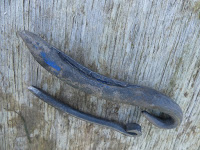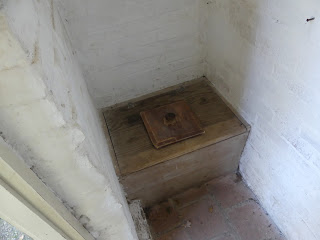I've been meaning to get around to visiting Chiltern Open Air Museum for some time but often found other good stuff in the way. I had a free Monday, the Autumn weather was kind so I had no excuse and took off. It's a journey of under an hour in laboratory conditions but knowing what a fickle road the M25 can be I built in a little extra and arrived a bit earlier than expected. Interesting to note that my satnav got me to my destination a couple of minutes early and I had to drive on a little.
It opens at ten and thankfully the loo block near the entrance was open to spend a penny. It set the tone as it was a block formerly used by a tram company complete with carbolic soap. As I waited by the door Sue the director spoke to me and said that she'd let me into the shop to wait a soon as the till was in place which was rather nice.
After a chat with the lady in the shop I headed out as the first and only person there at the start so I made a point of getting some shots in. Now this is one of the newer buildings (all from the Chiltern area) but there are many older ones and it was a chance to use the sepia facility on my camera.
So the Harpenden Well Head was the first to go sepia...
Followed by the Garston Forge smithy. Although the smithy wasn't working there was a loop of hammer blows and the like to set the mood.
The oldest dwelling was the replica Roundhouse and with the sun so low and bright it hides the pylon that sits rather close to the site. Note the little orange blob the fire makes through the door.
Inside there are expected things like Quern stone but I'd never seen a 'fridge' in one. By the door I noticed some Good King Henry growing which is a sort of Spinach type vegetable.
This led onto the roundhouse herb garden nearby which had things like Comfrey (old edible and good for bone breaks), Soapwort (contains saponins), Tansy (has anti insect properties), Lady's Bedstraw (bedding and rennet like properties), Yellow Archangel (multiple medicinal uses), Wild Strawberries (edible fruit), Madder (dye), St. John's Wort (depression).
I was also shown a Woad grinder and some cream that a school group had just made by beating full cream mile with a simple Willow whisk...Good work year one!
Another sepia moment with a view up to the farm display. Not far from the farm was the café and even when I got my jacket potato it came on a flowery plate from perhaps the sixties or even earlier. There was a radio cassette player behind the counter knocking out background music. It was old but I'm guessing that it was just one someone has had for a while as opposed to a period piece.
This outside loo was in the High Wycombe toll house, a loo not dissimilar to the compost type loos that a lot of bushcraft schools use.
Inside the place had a traditional and rather inviting fireplace which was the opposite of the rather austere looking rooms. I noticed a trivet not unlike like mine, and ironware that looked a cross between a Dutch oven and South African potjiekos in the corner.
For me that was a spot on half day to study the old buildings and take in a bit of nostalgia, from a time when the tools on show would outlast todays mass produced ones, and it worth poinbtaing out all the staff and volunteers I spoke to were really friendly. There is a good amount of different tree species there (and indeed woodland walks) and as I wandered I stocked up on Acorns to make some Acorn flour at some stage (well not the one in the picture). Worth a visit/ supporting folks.
Site map here.















No comments:
Post a Comment